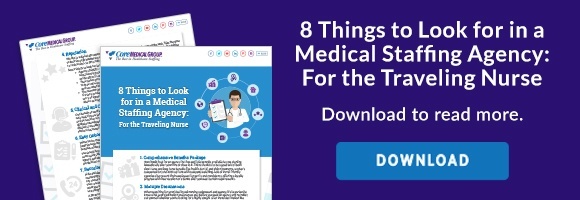
* Blog originally published on 5/16/16 was updated on 12/1/20
Congratulations! You nailed the first interview. Now, you’re prepping for the next big step: your nursing peer interview.
First off, what is a peer interview for nurses? Whether you’re interviewing for a travel nursing or permanent position, it’s an opportunity for a job candidate to meet with current staff members that involves interview questions as well as a way to see if the candidate will fit well into the team and the organization as a whole.
Although a second interview can be incredibly exciting, it can simultaneously feel incredibly stressful.
In some ways, the peer interview can be even more nerve-wracking than interviewing with a boss or manager. Generally, you know what to expect from a primary job interview and can prepare your responses in advance. But how do you prepare for a peer interview?
Take a deep breath. It’s always great to think of it as an opportunity: multiple interviews allow you to learn more about the job, the culture of the healthcare facility, and even get to know the people you’ll be working with on a daily basis.
The best way to be prepared is to know what to expect, so here are a few things you can expect in your nursing peer interview.
Be Prepared to Speak with Multiple People
The first thing to expect in your peer interview is more than one interviewer. Nursing peer interviews often include several of the nurses from the floor or wing you are vying to be a part of, so prepare yourself for a panel-type interview.
If you've never experienced a panel interview before, this can seem a little daunting, but it's really not that different from a one-on-one interview. The most important thing to remember is to make sure you address all of the interviewers as equally as you can (even if one is asking all the questions).
Try to see and treat them as individuals with these tips:
• Introduce yourself to each interviewer when you walk in• Make eye contact with each of them as you answer questions
• Address your questions to the whole group if you can, or if the question relates to something one of the interviewers previously mentioned, be sure to point that out. For example: "You mentioned teamwork on the floor earlier, Liza..."
Note: if your interview is virtual, you can apply these same concepts! Just be sure to use their names to bring up specifics as you move through the conversation.
Brush Up on Knowledge About Specific Clinical Questions
Once you have the WHO and HOW down, it’s time to get into specifics of the WHAT.
There will be plenty of behavioral questions in a peer interview because they want to make sure you're a good fit for the team. So, it’s always a good idea to think through some memories you’ve had in your nursing experience and what you’ve learned from those experiences.
An example would go something like this: “Tell me about a time you had a challenging patient assignment and how did you handle it?” Make sure you take it a step beyond and analyze what you learned from the experience and how you handled similar situations after that.
They will also likely inquire into your clinical expertise with questions like this:
- • Provide an example of problem solving a patient’s care in this specialty area?
- • How would you apply research findings to your practice?
- • Tell us about a time a patient or a family was dissatisfied with your care, and how you handled it.
If you're a new grad, the panel may not be looking for you to have clinical specifics exactly right. These nurses have been in your shoes and likely have a good idea of what you've experienced and what you haven't. If you do have experience on the floor, you could be asked how you'd handle a specific situation:
- - How would you prioritize the following:
- • an OR tech waiting to transport a patient to surgery
- • a patient complaining of shortness of breath
- • a vomiting patient
Although you won’t know for sure what specific questions will arise, think calmly and treat it like a conversation you’d have with anyone else. Have confidence in your experience and knowledge, and be genuine with them. Remember, soft skills like communication and critical thinking go a long way when it comes to a peer interview.
Have Specific Questions of Your Own
Now it’s your turn to interview! A “good fit” goes both ways, so it’s important to know what you want to get out of this experience.
Your interviewers ask specific questions to measure your knowledge and interest, and you owe it to yourself to do the same with your questions.
Asking to have an interviewer's earlier point clarified is a great way to show you're listening.
Also, consider questions that show you're thinking long-term:
- • Do you have an orientation program? What is it like and how long does it run?
- • Do you have nurse educators available? What is the best time to see them?
- • Do you offer any support to continuing education?
- • When do you conduct performance evaluations and how are they done?
Remember, you also need to make sure these nurses, your peers and potential coworkers, are people you want to work with. Take the time to find out what they're like before you sign a contract.
Here are some pointed questions you could ask to get an insider’s view:
- • What do you enjoy about your job?
- • What is the most challenging thing about being a nurse in this environment?
- • What are the most important traits for a nurse to have to work here?
- • How would you describe your personal approach to patient care?
Interviews in any field can be stressful, but they don’t have to be. Be yourself, make genuine connections with your interviewers, and be curious about the role and the healthcare facility as a whole.
If you'd like more help on preparing for a peer interview, don't hesitate to contact one of our recruiters today!
